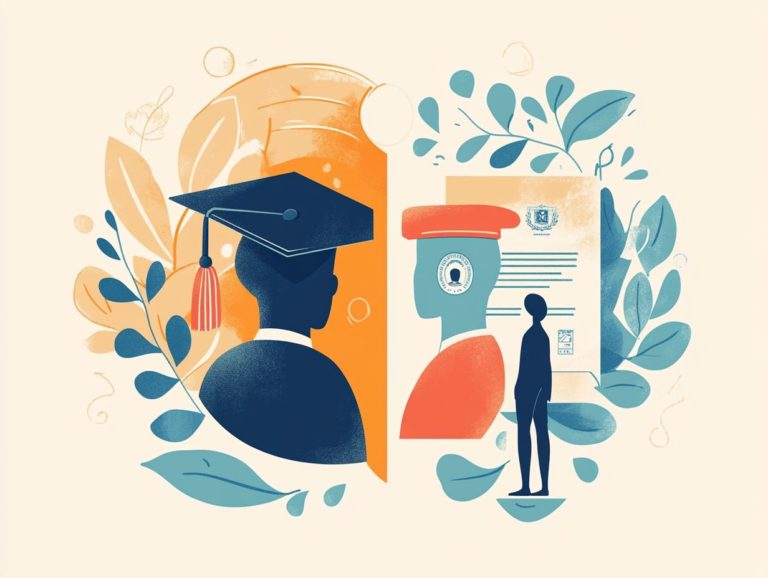Navigating the World of Educational Certifications
In today s fast-paced job market, educational certifications can truly be a game-changer for professionals striving to enhance their skills and advance their careers.
This article delves into educational certifications, helping you understand what they are and the various types available.
It outlines the benefits of obtaining certifications, guides you in choosing the right program, and walks you through the steps involved in the certification process.
Furthermore, it highlights how to maintain and renew your certifications to stay competitive. Dive in to discover how these credentials can elevate your professional journey.
Contents
Key Takeaways:

Educational certifications provide specialized training and knowledge in a specific industry or field. Obtaining educational certifications can lead to career advancement and help individuals stay relevant in a constantly evolving job market. When choosing a certification program, consider factors such as cost, time commitment, and industry recognition.
Understanding Educational Certifications
Understanding educational certifications is essential for professionals aiming to elevate their careers through structured learning pathways. These certifications validate your skills and enhance your employability while aligning you with industry standards.
They span a variety of fields, from digital marketing to healthcare training, showcasing your commitment to ongoing professional development.
Engaging with these certifications opens valuable networking opportunities and highlights the benefits of earning multiple educational certifications. They pave the way for career advancement through recognized programs, such as Google Certified Educator or Microsoft Innovative Educator.
By investing in certification courses, you position yourself for self-paced learning tailored to your interests and career aspirations.
What are Educational Certifications?
Educational certifications are formal acknowledgments awarded to individuals who successfully complete targeted courses or training programs aimed at enhancing their professional skills. These credentials are important for your career, reflecting a dedication to lifelong learning and competence across various fields, especially considering the future of educational certifications in a digital world.
You ll find a diverse array of courses, from concise workshops honing niche skills to extensive programs culminating in advanced certifications. Such qualifications hold significant relevance in industries like healthcare, information technology, and finance, where practical expertise is vital.
For example, if you re in the IT sector, you might pursue certifications such as:
- CompTIA – recognized for essential IT skills.
- Cisco – known for networking expertise.
Meanwhile, those in healthcare may seek programs accredited by esteemed organizations like the American Nurses Credentialing Center. Both paths emphasize the importance of continuous education in today s ever-evolving job market.
Types of Educational Certifications

Educational certifications generally fall into two main categories:
- Industry-specific certifications, which focus on particular fields.
- General education certifications, designed to equip you with foundational skills applicable across various professions.
Industry-Specific Certifications
Industry-specific certifications, such as the Google Certified Educator and Microsoft Innovative Educator, validate your expertise in specific fields. They offer specialized knowledge that aligns seamlessly with industry standards.
These certifications highlight your dedication to growth! They arm you with a competitive advantage in an increasingly saturated job market.
Take digital marketing, for example; certifications from platforms like HubSpot and the Digital Marketing Institute equip you with contemporary skills in SEO, content marketing, and analytics that employers actively seek.
In the healthcare sector, certifications like Certified Nursing Assistant (CNA) or Basic Life Support (BLS) training underscore your adherence to rigorous standards and showcase your competency in critical areas, significantly enhancing your employability and prospects for career advancement.
Don’t miss out! Start exploring certification programs today to take your career to the next level.
General Education Certifications
General education certifications lay a solid foundation for you, enhancing your teaching practices and educational methods across various subjects.
These certifications provide essential insights into planning what is taught in schools while highlighting the importance of effective teaching strategies. To learn more about what to consider, check out the top 10 questions to ask about educational certifications.
When you engage in specialized training in general education, you become better equipped to create engaging and relevant course materials that resonate with diverse student populations.
This improvement not only enhances the learning experience but also ensures that educational objectives are met, enabling students to reach their full potential.
In today’s fast-paced world, understanding the evolution of educational certifications is invaluable for your ongoing professional development. They help you stay updated on best practices and innovative teaching approaches, keeping your instruction fresh and impactful.
The Benefits of Obtaining Certifications

Obtaining certifications offers numerous advantages, including advancing your career opportunities, enhancing your skills, and improving how employers view you.
This positions you as a more competitive candidate in the job market and opens doors to greater professional possibilities.
Advancing Career Opportunities
Advancing your career opportunities is one of the most significant benefits of obtaining certifications. They often lead to higher qualifications and recognition within professional organizations.
By showcasing your commitment to professional growth, you can stand out in a crowded job market, making your applications more appealing to potential employers.
Certifications validate your skills and knowledge, signaling to hiring managers that you are serious about your profession and willing to invest in your future.
In today s shifting landscape, where technologies and industry standards change rapidly, maintaining relevant certifications ensures you remain knowledgeable and competitive.
This ongoing education fosters continuous learning, allowing you to stay ahead of trends and challenges, ultimately promoting sustained career advancement.
Staying Relevant in a Changing Job Market
Staying relevant in a changing job market is crucial, and obtaining certifications plays a vital role in enhancing your skills and integrating new technologies.
The workplace landscape is evolving quickly, driven by technological advancements reshaping entire industries. Therefore, actively engaging in continuous learning is essential, enabling you to not just keep pace but to lead in your field.
Online learning platforms have become invaluable resources for aspiring professionals, offering flexible access to courses that provide the necessary tools and knowledge to earn relevant certifications.
These platforms allow you to customize your educational journey, helping you adapt swiftly to new demands and align your skills with modern job market expectations.
How to Choose the Right Certification Program

Selecting the ideal certification program requires a thoughtful assessment of several key factors.
Consider your personal interests, career aspirations, and ensure the course content aligns with industry standards.
Making an informed choice will set the stage for your professional development and future success.
Factors to Consider
When weighing a certification program, assess factors like flexible schedules, course evaluations, accessibility, and instructor expertise. These elements significantly shape your educational journey.
Flexible schedules help you balance your studies with personal and professional commitments. This balance enhances your retention and engagement.
Comprehensive course evaluations provide insights into the program’s effectiveness. They ensure the material meets industry standards and your learning needs.
Easy access to resources creates an inclusive environment for all participants. This support fosters better learning experiences.
The qualifications and teaching style of instructors impact your learning. Their expertise enriches the curriculum and boosts your confidence in applying new skills.
Navigating the certification process may seem daunting, but understanding the necessary steps makes it manageable. Learning about the role of educational certifications in professional development can provide clarity and help you validate your knowledge effectively.
Steps to Obtaining a Certification
Obtaining a certification involves several key steps that deserve your attention.
- Select a program that aligns with your career goals. Research thoroughly to ensure the content is relevant and current.
- After identifying the right program, review the syllabus carefully. Create a study plan that fits your personal schedule to promote effective time management.
- Use resources like discussion forums, practice quizzes, and instructional videos. These tools deepen your understanding and retention of the material.
- Regularly assess your progress through quizzes and external checkpoints. Tracking your advancement boosts motivation and confidence as you prepare for the final evaluation.
Maintaining and Renewing Certifications
Maintaining and renewing your certifications requires staying informed about continuing education requirements. Follow the rules that keep education programs effective and relevant.
This commitment ensures your credentials remain respected in your field.
Continuing Education Requirements
Continuing education requirements are vital for certification renewal. They ensure you stay aligned with industry standards and advancements.
These requirements include activities like attending workshops, completing online courses, and participating in webinars. Each of these is designed to enhance your skills and knowledge.
You must gather a specific number of credit hours within a set time frame, which may vary by industry. Ongoing education is crucial now more than ever in a rapidly changing job market.
Engaging in these learning opportunities helps you maintain your credentials. It also positions you competitively to adapt and thrive amid constant change.
Frequently Asked Questions
-
What are educational certifications and why are they important?
Educational certifications are formal qualifications showing your knowledge in a specific area. They enhance job prospects, salary potential, and professional credibility.
-
How do I choose the right educational certification for me?
The right certification depends on your career goals and interests. Research different options to find one that aligns with your objectives.
-
Do all educational certifications have the same level of recognition?
No, recognition varies. Some certifications are more respected in certain industries, so it’s essential to research their reputation.
-
Can I earn multiple educational certifications?
Yes, many professionals pursue multiple certifications to broaden their skills and enhance marketability.
-
Can I pursue an educational certification while working full-time?
Yes, many certifications offer flexible options like online courses, making it feasible to study while working.
-
Are there financial assistance options for educational certifications?
Yes, options like scholarships, grants, and employer reimbursement programs can help offset costs. Research these opportunities!






